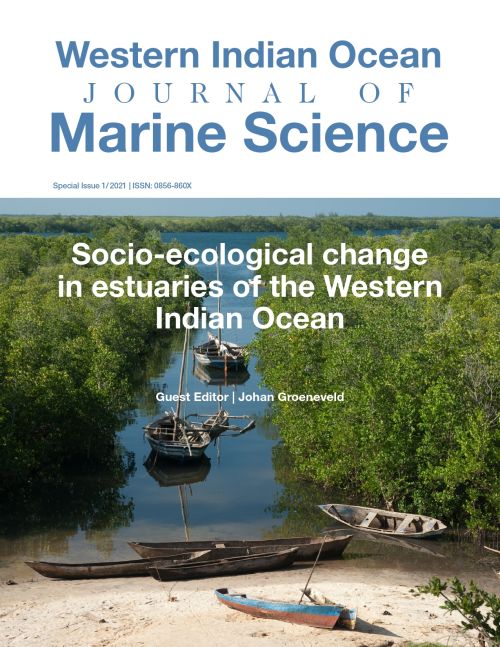Main Article Content
Socio-ecological change in the Ruvu Estuary in Tanzania, inferred from land-use and land-cover (LULC) analysis and estuarine fisheries
Abstract
Ecosystem goods and services derived from estuaries have sustained coastal livelihoods in the Western Indian Ocean (WIO) region throughout recorded history. Estuaries provide fertile and seasonally irrigated space for planting crops, mangrove products for construction and fuel, and fish as a protein source. Human population growth and an escalating demand for natural resources threaten estuarine critical habitats and their functioning, exacerbated by the effects of climate change. Decadal and seasonal land-use and land-cover (LULC) changes in the Ruvu Estuary in Tanzania were investigated through analysis of Landsat 5/8 and Sentinel-2 satellite images. The estuary is river-dominated and truncated near the coast during high river flow, with tidal influence extending approximately 12 km upstream during low river flow. LULC change detection targeting nine classes (water, developed, barren, forest, grasslands, cultivated, mangroves, wetlands and mudflats) showed that estuary-associated wetlands and mangroves had declined significantly over the past two decades (1995-2016) making way for developed land (growth of Bagamoyo Town), cultivated land (agricultural expansion with increasing population) and grasslands (coastal habitat changes). Seasonal LULC changes were conversion of wetlands to cultivated land after the wet season, and transformation of fallow wetlands to grasslands. The estuarine fishery relied on a small number of mainly freshwater and marine migrant species, compared to a highly diverse mix of mainly marine species in the nearby coastal fishery. The sparsity of quantitative fisheries data, spectral confusion when modelling land-cover change, and absence of household survey data to assess livelihood activities remain major information gaps. Generalized recommendations for improving socio-ecological change studies in WIO estuarine systems are provided.




